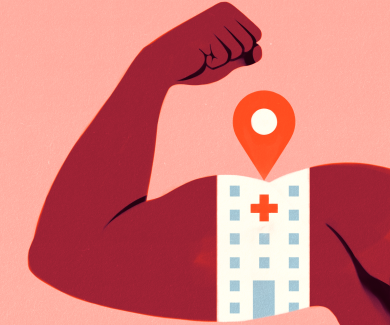4 Ways to Decolonize Global Health
A child of colonialism, global health began with the export of Western concepts of health and medical care—and the protection of colonizers from local diseases. Here’s how committed insurgents in the field are overturning those lingering perspectives.
1. Don't accept the status quo.
What does colonization (and decolonization) look like in low- and middle-income countries? Patricia Garcia has had many firsthand views. Garcia, MD, MPH, is Peru’s former Minister of Health and former dean of public health at the Universidad Peruana Cayetano Heredia in Lima, where she is now a professor.
Garcia has seen people from richer countries come to Peru, do research, soak up resources and credit, and leave little behind—not even the new drugs that were initially tested there.
Her students end up working on other people’s projects. Academics become unpaid mentors.
Perhaps the worst example of global health colonialism in Peru happened a few years ago. During an outbreak of multidrug-resistant TB, Garcia asked the country’s biobank for past samples so she could gauge how long the strain had been in the country. But she couldn’t do the study—the samples had been given to an American researcher several years before. “He said that he wanted to do some very important studies that we could never do here,” says Garcia.
Instead, she says, the researcher could have set up a lab in Peru, with Peruvian scientists.
She blames both the Global North and the Global South. “People settle for the status quo,” she says, “because they think that that’s all that’s possible.”
But, she says, there are ways to do things right: “Come in and ask us what we think is important. And create capacity.”
Several years ago, UPCH teamed up with the University of Washington—where Garcia earned her MPH—to launch a fellowship program that trained Peruvians and Americans, pairing them up for projects and global health courses as well.
Another example: For 30 years, Robert Gilman, MD, a professor in International Health at the Bloomberg School, has led a joint program with UPCH, training hundreds of people from Peru and the Global North and supporting research that has led to the publication of more than 600 peer-reviewed papers.
2. Change the Teaching.
For Anna Kalbarczyk, decolonizing global health starts with teaching, especially in travel courses that prepare students for their short-term experiences in the field.
The applied learning component of many global health programs is one of the “most colonial practices in education,” says Kalbarczyk, DrPH ’20, MPH, assistant director of the Center for Global Health at the Bloomberg School. “We often are sending un- or undertrained students into unfamiliar settings and expecting them or even encouraging them to be experts, and further expecting our international colleagues and partners to mentor and take responsibility for them.”
Kalbarczyk, an assistant scientist in International Health who teaches a course in international travel preparation, safety, and wellness, fears that learning experiences can sometimes contribute to inequities in global health. Analyses in the global health literature back her up; one notes that some experiences would be illegal if done in the U.S. So, she teaches her students to avoid doing things outside their scope of work and to actively learn about cultural competencies and ethical engagement.
One of her assignments is to discuss an article in Medium by early-career U.S.-trained physicians who came to regret their actions, including the obstetrician who encouraged a C-section in Uganda without realizing that the lack of available follow-up care would imperil the baby.
Kalbarczyk would like to see students taught that on-the-ground projects need to be co-designed by on-the-ground partners. She also thinks local supervisors should be paid for the time they spend mentoring and teaching visiting students.
It’s past time for the global health curriculum to address decolonization, she says. Schools need to support faculty efforts to redesign out-of-date curricula.
“We teach how we’re taught,” she says. “If we keep perpetuating colonial practice in our teaching, we keep perpetuating colonial practice in global health.”
3. Build Up Local Power.
Can NGOs founded as “savior” organizations change their ways? One of the first classic medical missions did.
Fifty years ago, ReSurge started sending American teams into unserved parts of Mexico and Central America (and eventually Africa and Asia) to do reconstructive surgery like burn repair and cleft palate work.
“The program was designed around the needs of U.S. surgical residents to have greater access to patients with conditions that would respond to reconstructive surgery,” says Jeff Whisenant, president and CEO.
The teams would fly in, do the surgeries, and fly back home.
But in the 1980s and ’90s, says Whisenant, the group began a “robust debate” about reorienting the organization’s focus from surgical residents to patients.
Then Shankar Man Rai, a Nepali surgeon who had trained with ReSurge, convinced the chief medical officer that training local doctors, nurses, and support personnel and supplying some needed hardware would do more to help people needing reconstructive burn scar repair, cleft lip and palate repair, as well as correction of other congenital conditions and physical injuries. With local health workers, they could provide follow-up visits and year-round care.
“There’s a big level of humility that’s necessary for that versus foundations and philanthropy sitting in their homes in the U.S. just thinking, ‘I want to do this activity. That seems great,’” says Natalie Meyers, MPH, chief program officer at ReSurge.
The organization, formerly known as Interplast, is now sponsoring Rai and other experienced local surgeons experienced in operating with few resources to train others in the Global South.
And ReSurge is also asking ministers of health how it can best partner with them to meet their own goals. “The biggest piece for us in the U.S.,” says Meyers, “is to be enablers, and convene data, and help national governments create networks of health professionals who can not only do the work, but train others.”
4. Find out if you’re a colonizer/decolonizer.
Say your institution—a university, NGO, government agency, pharmaceutical company, etc.—does some kind of research in the global health world. Where is it on the colonizer/decolonizer scale?
There’s a self-assessment guide that can help you work through that.
The 48-page Research Fairness Initiative guide from the Council on Health Research for Development (COHRED) has frank questions for organizations about their work’s benefits, costs, and outcomes. For example: Have you ensured the research results are relevant to the community? Will the process cause collateral damage such as hiring health care workers away from their day jobs? Will the project benefit the community, for example, by increasing its research capacity?
“If we accept that science and innovation are essential for the health and sustainable development of low- and middle-income countries, then you need mechanisms in place to make research collaborations equitable and supportive,” says Carel IJsselmuiden, MD, MPH, a University of KwaZulu-Natal professor and COHRED executive director.
Organizations can download the assessment for free. Or they can have it certified, meaning they’ll receive feedback from COHRED, which will also be published so that others can learn from their experience. So far, four reports have gone public, including those from WHO’s Research and Training in Tropical Diseases program and from Nova University in Lisbon. Three other institutions are currently awaiting certification.
“The RFI report is about institutional learning, transparency, and generating continuing action to improve fairness—not a report card but a forward-looking instrument,” IJsselmuiden says. Self-assessments can be valuable to both sides of a partnership.
“Your partners might read the report and say, ‘Well, you know, we don’t think you do enough on this. Or we think it’s fantastic that you do that. And so we prefer to collaborate with you, or we want to negotiate,’” says IJsselmuiden.



